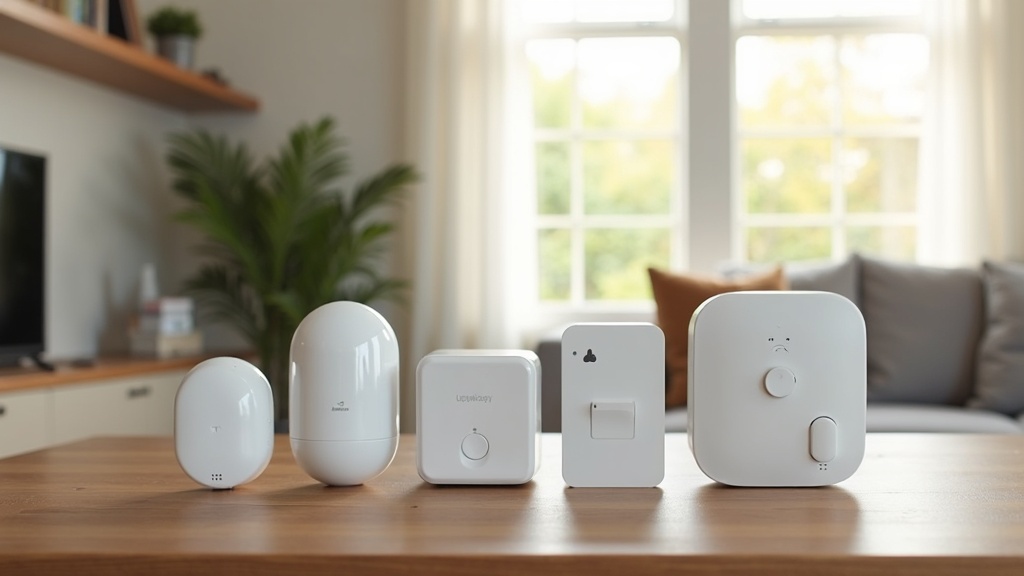Installing a smart home security system is one upgrade that actually makes life easier and safer at the same time. From app-based controls to voice alerts and real-time camera feeds, these systems go way beyond old-school alarm setups. Security tech has really stepped up in recent years, and adding smart features brings a bunch of practical perks for everyday life. Here I’m going to break down what you actually get out of having a smart home security system and why it’s worth checking out.

What Is a Smart Home Security System?
In simple terms, a smart home security system is a combo of sensors, cameras, alarms, and connected devices that work together and can be controlled through your phone, tablet, or even your voice. It’s basically a modern take on home security, offering a lot more flexibility. You can check feeds from your security cameras when you’re at work, get instant alerts if someone’s at the door, or even unlock your door remotely. That’s super convenient if you ever forget your keys.
The point isn’t just to catch a problem when it happens. These systems actually help prevent break-ins, give you peace of mind, and add useful features like package delivery alerts, smoke detection, or smart lighting. It’s a level up from traditional setups, and the ease of use is honestly one of the best things about it. Plus, the ongoing updates from manufacturers keep these systems fresh, continuously adding new options without needing you to upgrade hardware all the time.
Top Benefits of Smart Home Security Systems
Smart home security systems offer real benefits that go far beyond simply setting off an alarm. Here are some standout advantages that I’ve found make a big difference for homeowners:
- Remote Access: Monitor your home and control devices from anywhere using a smartphone app. I often check my cameras when I’m away, just to make sure everything looks good.
- Instant Notifications: Get alerts if a sensor is tripped, someone rings your doorbell, or there’s unusual activity. These real-time notifications allow you to react much faster than you could with a standard system.
- Smart Integration: Connect your security system with smart locks, lights, and even voice assistants like Alexa or Google Assistant. I’ve set up my system so my porch lights turn on automatically when motion is detected at night, and it does a great job of scaring off anyone who shouldn’t be there.
- Flexible Customization: You get to set up your system to match your family’s habits. Want to arm only certain sensors at night? No problem. Need to let a guest in while you’re not home? Just use your phone.
- Cost Savings: Some insurance companies will actually give you a discount on your premiums for having a monitored smart security system. Plus, with more ways to deter theft and catch issues quickly, you’re less likely to deal with expensive losses or repairs.
With this kind of flexibility and control, you’ll find your living space not only more secure, but also much easier to manage. If you have pets or kids, being able to check in while at the office or away on vacation brings extra confidence and convenience.
Are Smart Home Security Systems Worth It?
Based on my experience, and after chatting with other homeowners, the answer is usually yes. Upfront costs can vary a lot, but when you consider what you’re actually getting (like the ability to respond to emergencies faster, protect your loved ones, and keep your stuff secure), it really pays off in peace of mind. The technology is getting more affordable, too, and you often don’t even need professional installation. DIY options from brands like SimpliSafe, Ring, or Wyze are easy to set up and customize.
If you value knowing what’s going on around your place, or you want to automate things like locking up at night or turning on lights when you’re not home, smart security is definitely worth your time. I’ve found that just being able to see who’s at the door before answering is a small change that makes a huge difference, especially for families or anyone living alone. These systems are also scalable, so you can start small and grow your setup over time without having to replace everything at once.
Three Big Advantages of a Smart Home
Smart homes come with plenty of eye-catching perks; here are three that get mentioned most often:
- Improved Safety: From smart smoke detectors to window sensors, your whole house becomes more secure and you get alerts if anything unusual happens. The sense of watching over your own home, even from a distance, really can’t be overstated.
- Convenience: With automation, you can control lights, locks, and cameras from your phone. I especially like the idea of being able to schedule lights to come on when I’m out, which makes the place look lived in and reduces risk.
- Energy Efficiency: Many smart security systems also let you automate thermostats and control power-hungry devices. That means real savings on electric bills, not just extra safety. Having everything operate together offers more value than you’d expect at first glance.
These key points are just the start. Smart homes can also support family routines, help seniors live independently longer, and even monitor air quality or send reminders, amplifying their value way past just protecting your property.
Why Do We Need a Smart Home Security System?
We all want to feel safe, whether it’s just us at home or our families. Smart home security systems take a lot of stress off your shoulders because you can check in anytime and respond right away if there’s a problem. As someone who’s dealt with false alarms and missed package deliveries in the past, the thought of having an app that alerts me instantly (with video to show what’s going on) is a huge relief.
Aside from break-ins, smart systems help with everyday issues, too. For example, you can catch water leaks early thanks to smart moisture sensors, and you can make sure the kids got home from school by checking door sensor history right on your phone. It’s about having an extra layer of control and making life run a bit smoother. Having notifications for potential fire risks, package arrivals, or even leaving the garage door open gives you tools you didn’t know you needed until you have them.
What’s Included in a Typical Smart Security Setup?
Most systems come with a few essentials, but you can pick and choose extras based on your needs. Here are some main pieces you’ll usually find:
- Cameras: Indoor and outdoor security cameras stream footage to your phone and store recordings. Look for features like night vision or two-way audio.
- Door and Window Sensors: These let you know when a door or window is opened. You can check the status from anywhere.
- Smart Locks: Lock and unlock your door remotely, or give family members their own access codes.
- Motion Detectors: Pick up on any movement in a room or backyard and trigger alerts or recordings.
- Glass Break Sensors and Sirens: Alert you to broken windows or trigger loud alarms if something’s wrong.
- Environmental Sensors: Smart detectors for smoke, carbon monoxide, leaks, or temperature changes round out the setup and add a bunch of extra safety measures.
Getting all these gadgets talking to one another is where the magic happens. The app controls let you set schedules, customize notifications, or even set the mood by linking lights and security together at night. Some systems can even recognize familiar faces at the door, giving you more precise notifications and reducing those pesky false alarms.
Things to Think About Before Installing a Smart Security System
Jumping into smart security isn’t hard, but a few considerations help a lot:
- Wi-Fi Strength: Many systems rely on a strong, reliable Wi-Fi network. If you have dead zones or slow speeds, you might want to upgrade your router or get mesh Wi-Fi for better coverage.
- Privacy: With cameras and listening devices, privacy matters. Choose systems with good encryption and clear privacy policies. I suggest enabling two factor authentication on your accounts, and regularly checking access logs to see who’s controlling your system.
- Ease of Use: Make sure the system’s app is simple enough for everyone in your family to use. Some brands are more beginner friendly than others, so check reviews or try a demo if possible.
- Professional Monitoring: Decide if you want 24/7 monitoring by a security company, or if you prefer to keep an eye on things yourself. Professional monitoring can add a monthly fee, but it helps take the pressure off if you travel a lot or can’t always watch your phone.
Taking a little time to plan your system and read about your options makes sure you get the features that actually matter for your household. Remember, some systems offer simple contracts or no monthly fees at all, while others come with broader support and extra features, so be sure to check what’s included.
More Smart Security Tips and Tricks
Digging deeper, there are some handy ways to get even more from your system:
Set Custom Automation: For example, have your hallway lights turn on if the security system is disarmed late at night. It makes midnight trips to the fridge a whole lot safer (and fewer stubbed toes).
Share Limited Access: Many smart locks and security apps let you give guests, pet sitters, or house cleaners temporary codes that only work during set hours. No more leaving spare keys hidden under flower pots.
Integrate With Other Smart Tech: If you already use devices like Google Nest, Amazon Echo, or Apple HomeKit, look for security systems that easily integrate with your setup. It helps smooth the way by keeping everything under one app or voice command.
I’ve learned that tweaking automation and routines as you go makes a big difference, and you’ll likely stumble upon new ways to use the system that suit your family’s habits. Don’t be afraid to look up community forums or user reviews for clever routines or setups that people have already figured out—there’s a lot of helpful info out there.
Frequently Asked Questions
Here are some questions that come up regularly when folks are thinking about smart home security:
What is a key benefit of smart home security systems?
They give you real-time access to what’s happening at home, which means you can see, react, and even prevent problems before they escalate.
Are smart home security systems worth the price?
For many homeowners, the blend of extra safety, smarter alerts, and peace of mind easily justifies the investment. Plus, added features and potential insurance savings help offset the costs.
What are three major advantages of having a smart home?
You get better security, convenience, and energy savings, all of which improve daily life and reduce worries.
Why bother with a smart home system at all?
They help you stay on top of everything at home, no matter where you are, and offer tools for safety, efficiency, and daily convenience that older systems just can’t match.
Wrapping Up: Making Your Home Security Smarter
Upgrading to a smart home security system gives you more control, smarter protection, and a much easier daily routine. Whether you’re after more peace of mind, better automation, or just some next-level cool tech tricks, it’s a change that’s genuinely helpful. Setting up a personalized system tailored to your lifestyle is simpler than ever, and the added safety is something I really value every day. With so many customizable choices, you’ll find that modern smart security not only keeps your home safe but truly steps up the way you live and interact with your living space.
